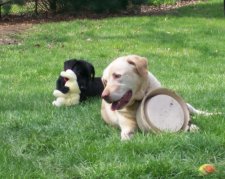Research Demonstrates Canine Jealousy
Published in the journal Proceedings of the National Academy of Sciences (PNAS), researchers at the Department of Neurobiology and Cognition Research at the University of Vienna conducted experiments on pairs of dogs. In the experiment, pairs of dogs were rewarded with a piece of food for presenting a paw to the researcher. When one of the dogs stopped receiving the reward but the other continued to be rewarded, the dog that was not receiving food stopped presenting their paw. To show that this behavior was due to the other dog continuing to receive the reward, the experiment was repeated without the other dog. In this case, dogs continued to present their paw after the reward stopped for far longer. When the perceived quality of reward varied – such as between sausage or bread – the behavior of the dogs was the same.
Dr Frederike Range, leading the research, concludes that the presence of the rewarded partner was influencing the dogs’ behavior, and that this may demonstrate the evolution of co-operative behaviors seen in human and primates. However, it was pointed out that the behavior may be as a result of the close co-operation between dogs and humans over thousands of years, and that the same behavior needs to be demonstrated in a more natural species to show how animals naturally exhibit jealousies or cooperate.
Dr Range now intends to carry out similar experiments with wolves, but considers the presentation of a paw to be too human-orientated to use in further work.














